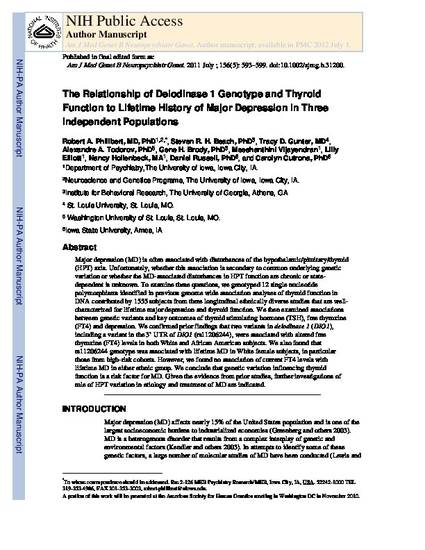
Major depression (MD) is often associated with disturbances of the hypothalamic/pituitary/thyroid (HPT) axis. Unfortunately, whether this association is secondary to common underlying genetic variation or whether the MD‐associated disturbances in HPT function are chronic or state‐dependent is unknown. To examine these questions, we genotyped 12 single nucleotide polymorphisms identified in previous genome wide association analyses of thyroid function in DNA contributed by 1,555 subjects from three longitudinal ethnically diverse studies that are well‐characterized for lifetime MD and thyroid function. We then examined associations between genetic variants and key outcomes of thyroid stimulating hormone, free thyroxine (FT4) and depression. We confirmed prior findings that two variants in deiodinase 1 (DIO1), including a variant in the 3′UTR of DIO1 (rs11206244), were associated with altered FT4 levels in both White and African American subjects. We also found that rs11206244 genotype was associated with lifetime MD in White female subjects, in particular those from high‐risk cohorts. However, we found no association of current FT4 levels with lifetime MD in either ethnic group. We conclude that genetic variation influencing thyroid function is a risk factor for MD. Given the evidence from prior studies, further investigations of role of HPT variation in etiology and treatment of MD are indicated.
Available at: http://works.bepress.com/carolyn_cutrona/33/

This is the peer-reviewed version of the following article: Philibert, Robert A., Steven RH Beach, Tracy D. Gunter, Alexandre A. Todorov, Gene H. Brody, Meeshanthini Vijayendran, Lilly Elliott, Nancy Hollenbeck, Daniel Russell, and Carolyn Cutrona. "The relationship of deiodinase 1 genotype and thyroid function to lifetime history of major depression in three independent populations." American Journal of Medical Genetics Part B: Neuropsychiatric Genetics 156, no. 5 (2011): 593-599, which has been published in final form at DOI: 10.1002%2Fajmg.b.31200. This article may be used for non-commercial purposes in accordance with Wiley Terms and Conditions for Self-Archiving. Posted with permission.